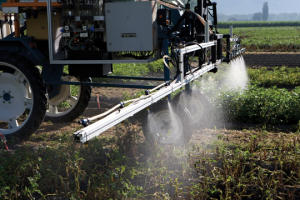Exclusive Q&A: Kline on Generic Crop Protection, Biopesticides Outlook for 2014

“Syngenta will be discounting seed next year because of abundant supply, so will they discount chemicals as well? This will be interesting to find out.” –Kline’s Joe Prochaska
Photo credit: Syngenta
The U.S. crop protection chemical industry is projected to grow 6.2% and become an $11 billion market at the distributor cost of goods sold level for 2013, according to a new report from research and consulting firm Kline & Company.
In a recent interview with Farm Chemicals International, Joe Prochaska of Kline’s Specialty Pesticide practice shared his insight into the findings and what is in store for the U.S. crop protection market in 2014.
Background: Leading Distributors in the U.S. Crop Protection Industry: A Strategic Market Analysis tracked the leading 17 distributors, covering more than 96% of total crop protection chemicals sales within the United States. Sales reported include both private-label crop protection chemicals and adjuvants, which include surfactants, oils, water conditioners, and drift control agents.
The report identifies the U.S. crop protection industry “as mature yet dynamic on a year-to-year basis with plenty of business opportunities for companies willing to take educated risks. Growth within this segment is being further driven by newer formulations and technology that support the highest-value crops.” Biopesticide use will continue to grow as new regulations and effective use combinations with traditional chemistry are adopted, Kline stated.
FCI: What were the biggest standouts of 2013?
Crop protection growth in the U.S. was driven by pre-season demand for herbicides, augmented by increasing concern over glyphosate-resistant weeds. Wet conditions in parts of the U.S. contributed to reduced insect pressure but created new opportunities for fungicides. Seed treatment sales continue to grow; U.S. seed treatment sales surpassed $1 billion in sales during 2012, according to the report.
FCI: What do you expect to see in the generic crop protection market in the coming year?
Generic companies held 30.9% of the U.S. crop protection market in 2012. We expect category sales to remain slightly down to flat, keeping in mind that a 5% gain in 2013 in generic sales would keep sales the same, or flat, as previous year within a total market increase of say 4%.
We think the major research-based manufacturers will maintain aggressive programs to preserve the off-patent share of products retained in their portfolios. Also, effective loyalty programs will tie chemicals in with seed and genetics; now Syngenta will be discounting seed next year because of abundant supply, so will they discount chemicals as well? This will be interesting to find out.
Despite the generic markets remaining slightly down to flat, I believe some of them will have an excellent year in 2014. Companies such as Amvac and FMC who have a strong portfolio of corn soil insecticides will continue to do well and likely sell out of these products again next year. With corn likely declining to $4.00-$4.50 per bushel, growers will not overlook the price point of generic products as they try to save on every acre applied.
FCI: How do you expect the spread of glyphosate resistance to impact crop protection categories going forward?
The pre-emergent herbicide market is expected to increase along with residual herbicides with overlapping action used to knock down weeds. Dow Agro Enlist traits are scheduled to arrive to market during 2015 growing season. The Enlist traits will provide a new generation of genetically engineered crops that will be resistant to established weed killers 2,4-D and dicamba. The newer formulations of 2,4-D and dicamba may place an impact on glyphosate sales, depending on how growers adapt to the new technology as well as whether there are any environmental issues with the active ingredients.
Additionally, we believe growers are beginning to understand the need for a comprehensive weed-management approach including using residual herbicides and products containing multiple modes of action to combat the resistance. Using appropriate adjuvants at the proper rate and application stage under optimal conditions to maximize performance can be beneficial in controlling resistant weeds.
Growers will begin to avoid cutting application rates if relying solely on glyphosate which is the quickest path to resistance. At the same time, growers are applying more glyphosate to kill the same amount of weeds as before. Growers will need to implement best management practices when dealing with glyphosate-resistant weeds including: scouting fields, planting into clean and weed-free fields, using multiple herbicides with different modes of action throughout the growing season, controlling weeds early when they are relatively small, applying herbicides at the recommended rate and time, and cleaning equipment.
FCI: What is Kline’s outlook for biopesticide demand in 2014, and what are the key drivers?
The biopesticide market is approaching 5% of the total crop protection manufacturing market. We think biopesticide demand will increase in 2014, particularly within the specialty fruit and vegetable crops in California and Florida. Growers are looking for solutions and ag retailers need to be able to provide high-quality, efficacious products that meet the needs of growers in addition to the government mandates in key states.
Biopesticides were once considered the product of choice only in high-value crops and among organic producers, while now the realization that biopesticides can play a synergistic role with traditional crop protection products is fueling market growth. We think with Bayer’s acquisition of AgraQuest last year in addition to BASF’s acquisition of Becker Underwood, these companies will push these products into new markets. Since these companies will likely do this on a global scale, what may not work right now within the U.S. will fit within the strict regulations of the countries within the EU.
We think overall there will be a very slight increase in 2014 with a push by the big players and companies such as Marrone Bio Innovations to look towards the major crop markets within three to five years. Unfortunately, the biopesticide market faces some key challenges in the future due to an expected higher standard of performance for biologicals than for traditional chemistry. New synthetic chemistry developed by the major research-based manufacturers (“basics”) will tend to meet, if not satisfy in all cases, many of the criteria established by biologicals and tend to diminish any big opportunities.
FCI: Overall, what are the main opportunities in your view for crop protection companies in the U.S. in 2014?
The opportunities for crop protection manufacturers lie in educating at the grower level. Because farms are consolidating with increasingly more acreage controlled by fewer customers, the manufacturers need to know which customers they are servicing. In 2014, the market is expected to be a “slow growth” market which can create several issues for manufacturers:
- More demanding customers who are focused on
- Pricing and price comparison
- Negotiation of services
- More assurance of product performance
- More aggressive competitors and suppliers
- Margin pressures
Typically in these slower markets manufacturers will need to be better prepared than in the past at managing their business as larger producers will have a new set of demands. This will likely be accomplished through several ways, including:
- Consolidation:
- Consolidation will drive efficiencies.
- The older/smaller companies and growers will exit the market.
- Market research information will be used more to gain market intelligence.
- Partnerships:
- New services, information, insights not likely to reside in one company.
- Demand for personalized insights met through tight linkages.
- Uncertainty of new marketplace is best managed through Strategic Alliances and Joint Ventures.
- Human Talent:
- Younger generation will bring new set of skills needed to manage strategic business plans.
- Increasing sophistication of general workforce will be needed, i.e., Master’s degrees and continuing education focused on specific areas of business.
- Agricultural industry background will become increasingly more important as the industry evolves.






